
Jean-Baptiste Cavaignac (10 January 1763 – 24 March 1829) was a French politician and statesman.

Jean-Baptiste Cavaignac (10 January 1763 – 24 March 1829) was a French politician and statesman.
Born at Gourdon (Lot département ), he was, after the outbreak of the French Revolution, a member of the département's directory and then elected its deputy to the National Convention, where he associated himself with the party of the Mountain and voted in favor of the death penalty for King Louis XVI. [1]
He was constantly employed on missions in the provinces and distinguished himself by his staunch repression of the anti-Revolution risings in the newly designed départements of Landes, Basses-Pyrénées, and Gers. He represented the Convention in the Revolutionary Armies of Brest and of the Eastern Pyrenees in 1793, and in 1795 he was sent to the armies of the Moselle and the Rhine. With his colleague Jacques Pinet (1754–1844), he established at Bayonne a revolutionary tribunal, with authority in the neighboring towns. [1] He went on to unleash a terror campaign aimed at imposing the French revolutionary discipline in the region.
Cavaignac managed to escape prosecution during the Thermidorian Reaction, assisted Paul Barras in resisting to the 13 Vendémiaire insurgency, and was a member of the Council of Five Hundred for a short while during the French Directory. Cavaignac filled various minor administrative offices under the Consulate and French Empire and in 1806 became an official in Joachim Murat's administration of the Kingdom of Naples.[ citation needed ] During the Hundred Days, he was préfet of the Somme. At the Bourbon Restoration, he was proscribed as a " regicide " and spent the last years of his life in Brussels, where he died. [1]
On appointment as chief executive representative of the Convention in the French army stationed in the Basses-Pyrénées along with Pinet and Monestier (as civil representatives), the inhabitants of the recently suppressed Basque province of Labourd were shocked by a number of excesses and abuses. The Convention official is reported to relish riding in a lavish carriage pulled by four white horses across Labourd. Each time he approached a community or town, e.g. Saint-Jean-de-Luz, its inhabitants were constrained to step over and cheer waving a laurel bouquet to the cry "Long live Cavaignac, his colleagues, the Mountain and the Convention." [2] His appointment was also followed by unrestrained revolutionary takeover and over-zeal, including a prohibition to use Basque in all public transactions and school (proclaiming that "fanaticism speaks Basque"), as well as the indiscriminate deportation of thousands of residents to the Landes of Gascony.
Estimations on the number of deportees range from 4,000 to 8,000, representing between a quarter and half of the inhabitants of 17 villages of southern Labourd, of which 1,600 never returned alive. A local society denounced Cavaignac for cruelty before a tribunal of the reshuffled Convention in 1795, who went on to acknowledge the consideration of victims to the civilians, but neither Cavaignac nor any other high-ranking official was held accountable. [3]
During August 1794 in the context of the War of the Pyrenees, as the highest authority of the Convention in Bayonne, he was in charge of negotiations with the representatives of the bordering Basque Spanish district of Gipuzkoa seeking detachment from Spain and conditional allegiance to France. Cavaignac's and Pinet's confrontational and clean-sweep approach towards a possible Gipuzkoan protectorate by France broke any possibilities of an understanding with the regional authorities. Cavaignac went on to order their arrest and imprisonment in Bayonne, [4] with the Gipuzkoans opting to turn their loyalty to the Spanish heir apparent Ferdinand VII and raise a militia against the French.

Pyrénées-Atlantiques is a department in the southwest corner of France and of the region of Nouvelle-Aquitaine. Named after the Pyrenees mountain range and the Atlantic Ocean, it covers the French Basque Country and the Béarn. Its prefecture is Pau. In 2019, it had a population of 682,621.

Dominique Joseph Garat was a French Basque writer, lawyer, journalist, philosopher and politician.

Soule is a former viscounty and French province and part of the present-day Pyrénées-Atlantiques département. It is divided into two cantons of the arrondissement (district) of Oloron-Sainte-Marie, and a part of the canton of Saint Palais.

Labourd is a former French province and part of the present-day Pyrénées Atlantiques département. It is one of the traditional Basque provinces, and identified as one of the territorial component parts of the Basque Country by many, especially by the Basque nationalists.

The War of the Pyrenees, also known as War of Roussillon or War of the Convention, was the Pyrenean front of the First Coalition's war against the First French Republic. It pitted Revolutionary France against the kingdoms of Spain and Portugal from March 1793 to July 1795 during the French Revolutionary Wars.

Ahetze is a village and a commune in the Pyrénées-Atlantiques department in the Nouvelle-Aquitaine region in southwestern France. The commune is part of the urban area of Bayonne, and of the traditional Basque province of Labourd.

Urt is a village and a commune in the Pyrénées-Atlantiques department in south-western France. It is part of the traditional province of Labourd.

Boucau is a commune in the Pyrénées-Atlantiques department and Nouvelle-Aquitaine region of south-western France. It is located in the former province of Labourd.

Guéthary is a commune in the Pyrénées-Atlantiques department in southwestern France. It is located in the traditional Basque province of Labourd, the town traditionally standing on the northernmost coastal linguistic boundary of the Basque language. Guéthary station has rail connections to Hendaye, Bayonne and Bordeaux.
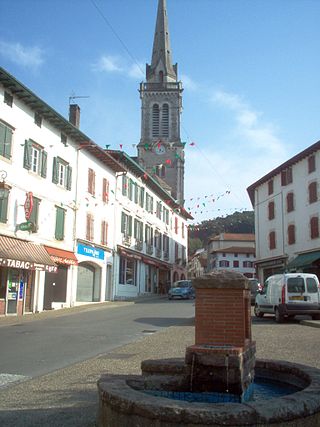
Hasparren is a commune in the Pyrénées-Atlantiques department in south-western France. A resident of Hasparren is known as a 'Hazpandar'.

Villefranque is a commune in the Pyrénées-Atlantiques department in south-western France. It is part of the traditional Basque province of Labourd. Villefranque station has rail connections to Saint-Jean-Pied-de-Port, Cambo-les-Bains and Bayonne.

Saint-Pée-sur-Nivelle is a village and a commune in the Pyrénées-Atlantiques department in southwestern France. It is part of the traditional Basque province of Labourd.
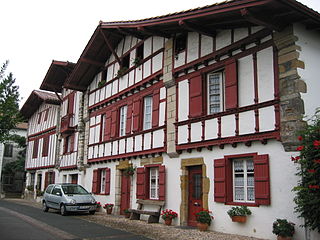
Ustaritz is a town in the traditional Basque province of Labourd, now a commune in the Pyrénées-Atlantiques department, southwestern France. It is located on the river Nive some 13 kilometres (8.1 mi) inland from Bayonne. Ustaritz station has rail connections to Saint-Jean-Pied-de-Port, Cambo-les-Bains and Bayonne.

Ayherre is a commune in the Pyrénées-Atlantiques department in the Nouvelle-Aquitaine region of south-western France.
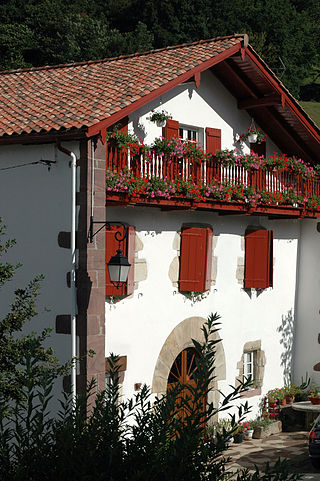
Saint-Étienne-de-Baïgorry is a commune in the Pyrénées-Atlantiques department in south-western France. It is part of the former province of Lower Navarre. It borders the municipality of Baztan to the west.

Arrast-Larrebieu is a commune in the Pyrénées-Atlantiques department in the Nouvelle-Aquitaine region of south-western France.
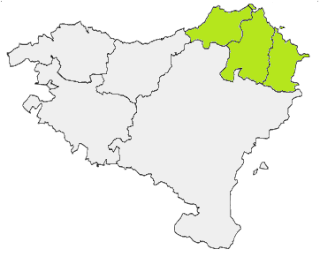
The French Basque Country, or Northern Basque Country, is a region lying on the west of the French department of the Pyrénées-Atlantiques. Since 1 January 2017, it constitutes the Basque Municipal Community presided over by Jean-René Etchegaray.

The Basques are an indigenous ethno-linguistic group mainly inhabiting Basque Country. Their history is therefore interconnected with Spanish and French history and also with the history of many other past and present countries, particularly in Europe and the Americas, where a large number of their descendants keep attached to their roots, clustering around Basque clubs which are centers for Basque people.
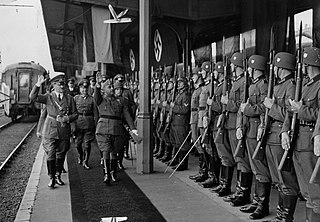
World War II in the Basque Country refers to the period extending from 1940 to 1945. It affected the French Basque Country, but also bordering areas across the Pyrenees on account of the instability following the end of the Spanish Civil War, and the friendly ties between Germany, Vichy France, and the triumphant Spanish military dictatorship.
The end of Basque home rule or foruak/fors, the native institutional and legal system, took place during the French revolutionary period (1789-1795). The final violent dissolution of the semi-autonomous Basque institutional and legal system was coupled with the arrival of French troops to the Basque Country within the War of the Pyrenees and a deliberate terror on the Basque population centred in Labourd.